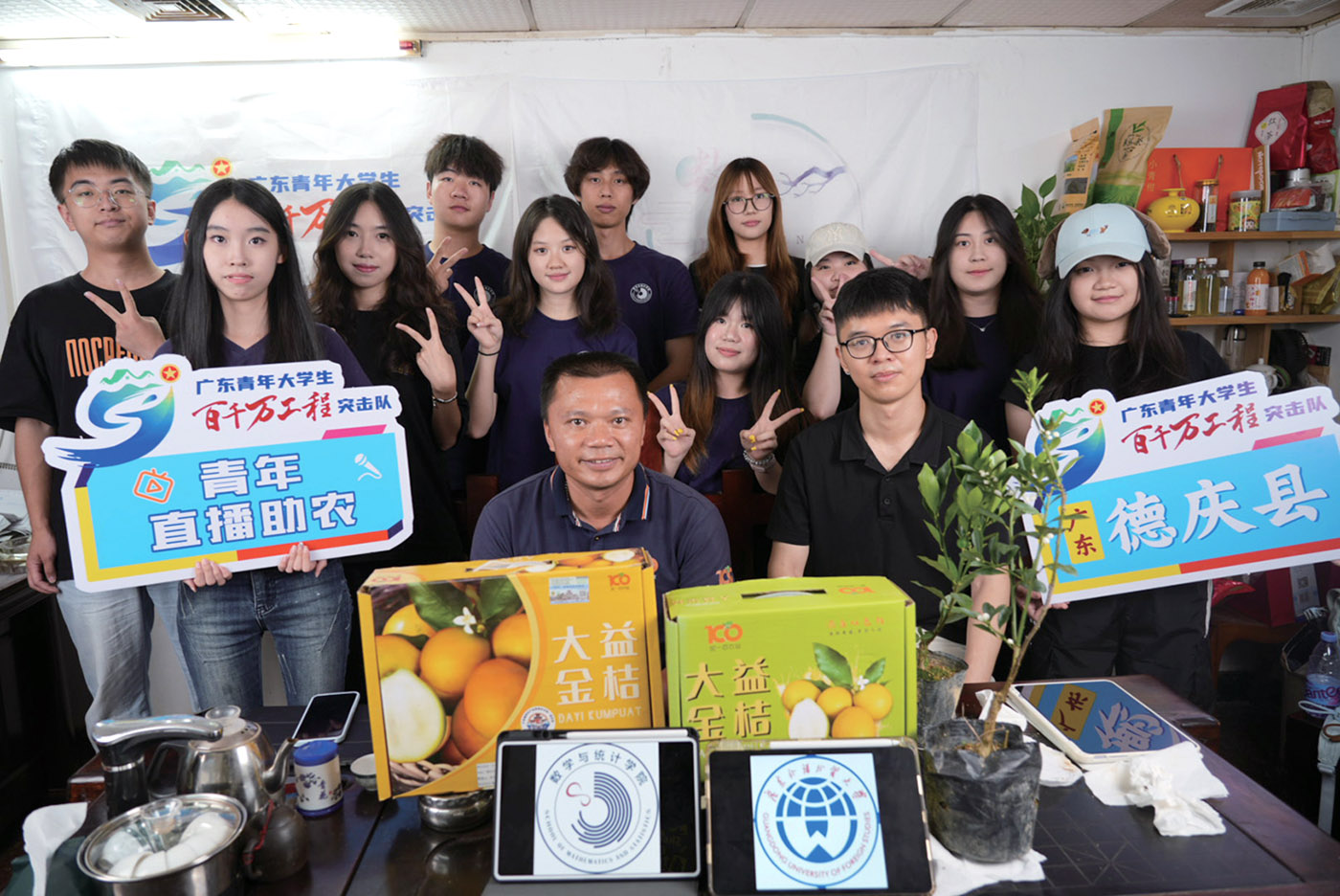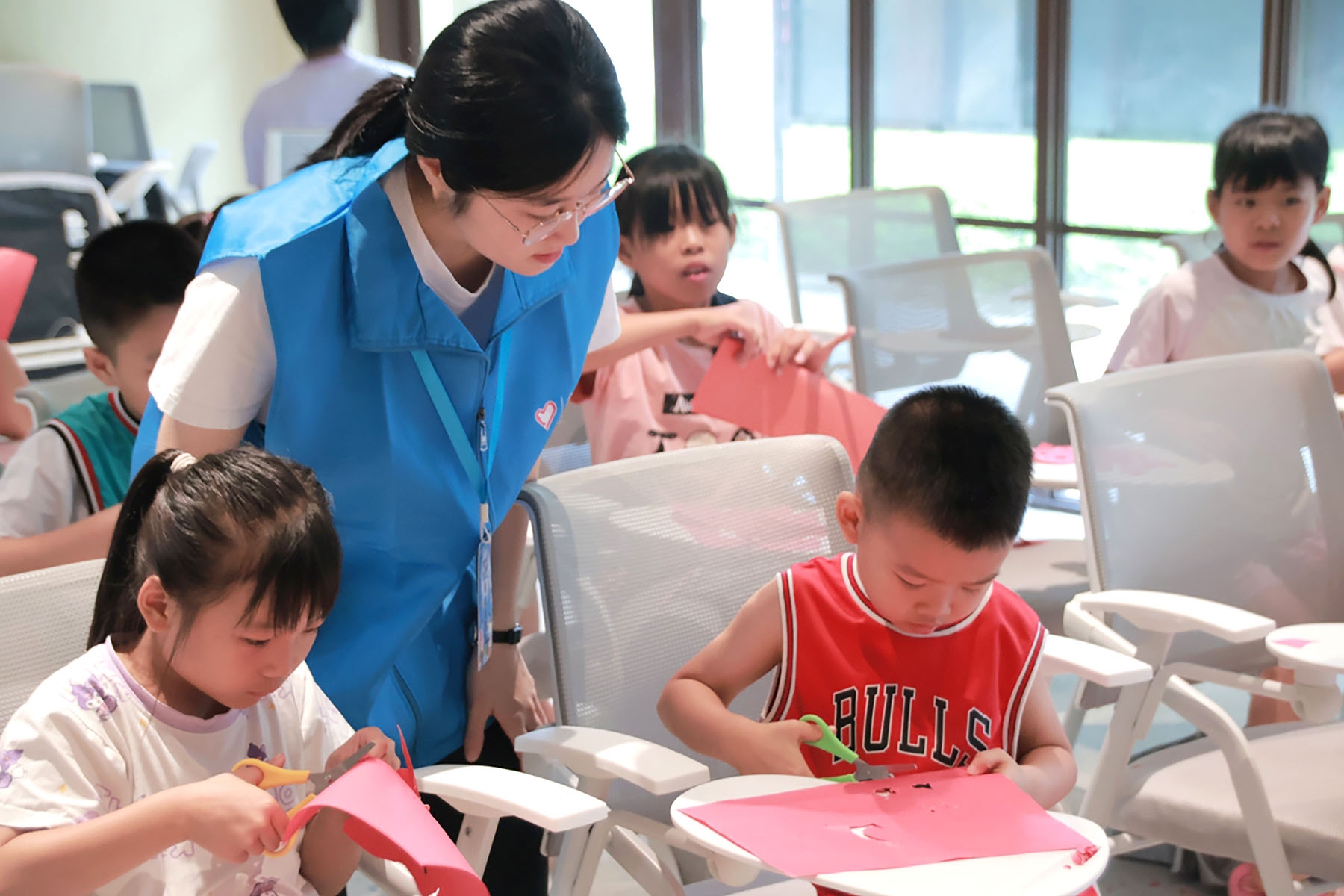University students bring education and innovation to rural communities, linking personal growth with Guangdong's revitalization project.

In the heart of northern Guangdong's Ruyuan Yao autonomous county — known as the "hometown of the Guoshan Yao", one of the most picturesque branches of the Yao ethnic group — 20-year-old Deng Haowen discovered more than scenic mountains and clear skies.
Beneath the county's natural beauty lie long-standing development challenges. In education alone, there are only 12 primary schools across 2,299 square kilometers, leaving many children, especially those left behind by migrant parents, with limited guidance.
"During the holidays, a lot of them have nothing to do and can become overly dependent on the internet," Deng said.
Recognizing this shortage of educational resources, Deng, a journalism major at Guangdong University of Foreign Studies (GDUFS), has spent the past two summers running volunteer classes for local children.
His team designed courses that combine traditional culture with practical skills, from calligraphy and paper-cutting to mental health education and patriotic history lessons. Drawing on GDUFS' strengths in linguistics, they also introduced students to foreign languages such as English, Japanese, and Thai.
READ MORE: Volunteer educators reshape a rural school's future
Deng is one of many GDUFS students participating in the "Double Hundred Action", an initiative under Guangdong's "Hundred, Thousand, and Ten Thousand Project", which aims to foster high-quality development across 100 counties, 1,000 towns, and 10,000 villages.
GDUFS began its involvement in August 2023 by signing an agreement with Ruyuan to provide targeted support.
Since then, the university has sent service teams to assess grassroots needs and implement projects in six areas: cultural tourism, rural afforestation, legal education, agricultural e-commerce, environmental improvement, and volunteer classrooms.
This year alone, more than 500 volunteers, organized into 31 teams, have carried out over 40 activities across the county, bringing youthful energy and innovative ideas to rural development.

Heritage meets innovation
While Deng focused on education, fellow student Shen Meichi and her team traveled to Deqing county to explore ways of expanding rural economic opportunities.
Drawn by the area's rich cultural heritage — including the ancient Deqing Confucian Temple — they combined heritage promotion with modern marketing tools.
The team livestreamed the making of zhugao powder, a traditional rice snack dried in bamboo with a subtle, grainy aroma. The session attracted more than 30,000 likes and sparked online interest in local specialties.
"Young people are good at using new media to tackle old problems like limited market access," Shen said.
"We helped locals reach wider audiences through Xiaohongshu (RedNote), Douyin (the Chinese version of TikTok), and WeChat. We are also exploring e-commerce channels, including potential foreign trade platforms, to integrate intangible cultural heritage with agricultural products," she added.
The team also produced a bilingual travel guide that highlighted historical landmarks, examined local Lingnan architectural features, and traced the southward spread of Confucian culture.
Another team explored ways to make revolutionary education bases more appealing to younger audiences. They combined a murder-mystery role-playing game with visits to historical sites, transforming traditional museum-style tours into interactive storytelling experiences.
"Some young people might avoid cultural sites because they feel heavy or solemn," said Ma Xiangqi, a sophomore on the team. "By adding interactive elements, we make the history easier to connect with while still respecting its significance."
For journalism student Cheng Tianxiang, the summer provided an unfiltered glimpse into rural life.
Contrary to his initial expectation that agriculture was mainly about manual labor, he found that in Ruyuan, processes from planting to harvesting were over 90 percent mechanized in some areas.
He also realized how little agricultural knowledge they actually had.
"At first, my teammates couldn't tell millet from rice," he laughed. "But once we stepped into the fields, spoke with farmers, and witnessed the work up close, our perceptions changed completely."
The trip also revealed stark disparities: while some villages had thriving projects and improved living conditions, others struggled with idle farmland and slower development — an important reality in the ongoing process of rural revitalization.
ALSO READ: Living room to legacy
"For me, experiencing it in person was crucial," Cheng said. "You can't fully understand a place just by reading about it online. Only by walking its streets, talking to its people, and observing the land with your own eyes do you grasp the full picture — both its strengths and its challenges."
Deng felt the same, noting how firsthand experiences revealed the true impact of the Double Hundred Action.
His most memorable moments came from seeing students write letters to their future 18-year-old selves. One 6-year-old girl wished she could travel with her mother.
"Her parents are often away, and her dream was so simple compared with the ambitions of urban children, who might hope to enter top universities or achieve great success," he said. "It reminded me how important it is to spark curiosity and hope in their hearts."
"I feel a strong sense of belonging here," Deng added. "The blue skies, the friendly chats with residents, and the heartfelt moments in the classroom make me appreciate the value of my efforts. I hope to continue using my energy and enthusiasm to contribute to the development of this community."
Contact the writer at guojiatong@i21st.cn


